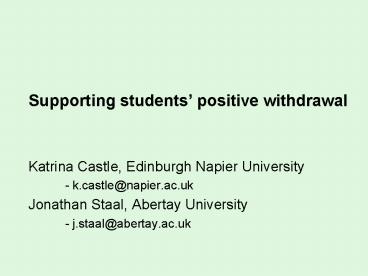Supporting students positive withdrawal - PowerPoint PPT Presentation
1 / 15
Title:
Supporting students positive withdrawal
Description:
Supporting students' positive withdrawal. Katrina Castle, Edinburgh Napier University ... entity, with its own branding or as part of a larger resource, e.g. Jorum. ... – PowerPoint PPT presentation
Number of Views:75
Avg rating:3.0/5.0
Title: Supporting students positive withdrawal
1
Supporting students positive withdrawal
- Katrina Castle, Edinburgh Napier University
- - k.castle_at_napier.ac.uk
- Jonathan Staal, Abertay University
- - j.staal_at_abertay.ac.uk
2
Two student bodies
- Edinburgh Napier
- Student population UG 12,008 TPG 2,294 RPG
170. - Age on entry 16-20 31 21-24 34 25 35.
- Gender balance Female 55 Male 45.
- Discipline mix Business 35 Creative
Industries 9 Computing 7 Engineering 11
Science 8 Social Science 4 Nursing 19
Customised Programme 7. - Fees status 70 home 12 EU 18 overseas.
- Disability No disability 93 Dyslexia 4
Other 3. - Abertay
- Student population UG 3,327 TPG 366 RPG 90.
- Age on entry 16-20 60 21-24 21 25 19.
- Gender balance Female 51 Male 49.
- Discipline mix Business 23 Computing 25
Science 17 Social Science 30 Nursing 5. - Fees status 82 home 15 EU 3 overseas.
- Disability No disability 93 Dyslexia 3
Other 4.
3
Two Student Bodies(data from UG 2007/08 cohort)
Student Status
4
Two Student Bodies(data from UG 2007/08 cohort)
Student Gender
Student Age
5
Discipline Mix
6
Two Student Bodies(data from UG 2007/08 cohort)
Fee Status
Disclosed Disability
7
Common reasons for withdrawal
- General
- Funding.
- Relationships.
- Health.
- Homesickness.
- Isolated / lonely.
- Change of plans.
- Poor results.
- Study load.
- Supervision problems.
- Wrong course.
- Other reasons.
- (UNE 2006).
- Edinburgh Napier
- Career change (38).
- Course not as expected (35).
- Family / personal issue (17).
- Academic failure (14).
- Health (14).
- Study Skills (13).
- Funding (9).
- Abertay
- Academic failure (36).
- Personal issues - various (11).
- Left with an intermediate award (7).
- Non-attendance (7).
- Unsuited to course (4).
- Health reasons (4).
- Funding (4).
8
Existing Support for Students Considering
Withdrawal
- Abertay
- Module / programme tutors.
- Personal tutors.
- Student Services, including academic support
advice. - Portal-based guidance to suspension / withdrawal
procedures.
- Edinburgh Napier
- Programme Management Teams.
- Personal Development Tutors.
- Faculty based Academic Support Advisers.
- Student Affairs based Student Advisers.
- What am I doing here? leaflets.
9
Supporting students to consider withdrawal as a
positive step forward
- Policy context
- Widening participation retention and progression
rates poorest among students from
low-participation neighbourhoods (SFC 2005). - Social circumstances students with the greatest
external constraints and the least choice of
what, where and how they study are more likely to
withdraw from their course (SFC 2007). - Lifelong learning students able to identify
positive aspects of their withdrawal from
university felt - In control of their situation when taking a well
thought-through decision to leave their course. - Better able to arrive at clearer ideas of their
short to medium-term future. - Better prepared to return to higher education in
the future (Quinn et al 2005).
10
University of New England Dont drop out.
11
Scotland Dont drop out a model?
12
A generic web resource to support student
withdrawal
- Rationale
- Enough similarities between institutions to
compensate differences to make collaboration
possible. - Shortfall in adequate provision.
- Benefits of a support website being not specific
to / associated with a single institution,
especially as the institution might be part
(/all) of the problem. - Efficient pooling of resources.
13
How might we develop such a website together?
- Creative Commons in Education licence so no
individual institutional claim to IP. - Generic core for each institution to adapt and
host locally or single, stand-alone comprehensive
entity, with its own branding or as part of a
larger resource, e.g. Jorum. - How could students become part of the site as
well as passive / semi-active users, e.g.
user-generated content and/or wiki-format? - Could some partners institutions contribute
content and others serve as critical friends to
review development? - What about medium to long-term maintenance and
growth to sustain the initiative? - Wheres the money coming from?
14
Break-out group discussion questions
- What diversity issues would a website supporting
students considering withdrawing from their
course need to address? - How to support critical self-reflection without
risking reinforcing negative patterns of thought
/ behaviour? - How to avoid a deficit approach that blames the
student (different to supporting them to
acknowledge an appropriate share of
responsibility)? - How do we make this attractive to those who just
disappear? - Should we aim to produce a stand-alone site that
any institution could link to from their own
pages or a generic core of materials that
institutions could then tailor and embed in their
own pages? - How best to tie in with each institutions
support systems (each with their own titles and
terminology)? - How best to tie in meaningfully with local,
regional and national sources of external
support, e.g. Breathing Space, CABx, Shelter? - Might your institution be interested in taking
the idea forward and, if so, who would be best to
contact?
15
References
- Quinn, J., Thomas, L., Slack, K., Casey, L.
Thexton, W. and Noble, J. 2005. From life
crisis to lifelong learning rethinking working
class drop-out from university. UK Joseph
Rowntree Foundation. - Scottish Funding Council. 2007. Choosing to
learn, learning to choose. Scotland SFC. - Scottish Funding Council. 2005. Learning for
all the report of the SFEFC/SHEFC widening
participation review group. Scotland SFC. - UNE. 2006. Dont drop out. online.
University of New England. Available from
http//www.une.edu.ac/dontdropout/reasons/index.ph
p Accessed 20 May 2008.































